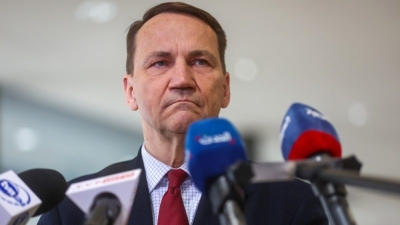Commissioner Breton’s visit to Bulgaria met with suspicion

EU Internal Market Commissioner Thierry Breton’s visit to Bulgaria on Wednesday (15 March) unleashed speculation that the country is being pressured to send ammunition supplies to Ukraine, a particularly sensitive subject just two weeks before a snap election.
The EU commissioner visited the city of Sopot, the site of the largest Bulgarian state factory for weapons and ammunition, VMZ, and held meetings with representatives of the country’s arms industry.
“The EU urgently needs to increase ammunition production for its own security. I visit countries with defence industries ready to increase their capacity. I start with Bulgaria because your country has a long history in the defence industry and is a very important partner in Europe,” Breton said, speaking to reporters in Bulgaria.
According to him, the war in Ukraine was depleting the reserves of the EU and NATO, recalling also the commitment of NATO countries to increase the funding of their armies to 2% of their GDP.
Over the coming days, Breton is expected to visit eleven more EU countries with the aim of encouraging them to increase their domestic armaments production.
Breton’s ‘defence tour’ comes as EU foreign and defence ministers are expected to greenlight a €2 billion plan to both resupply Ukraine and backfill Europe’s own stockpile of ammunition, based on an EU proposal seen by EURACTIV earlier this month.
As a first step, it is proposed to use an additional €1 billion of EU funds to obtain ammunition for Ukraine from their existing stockpiles, in particular 155mm artillery shells, and send them immediately.
As a second step, the plan calls for member states to agree on a joint purchase of 155mm ammunition from the bloc’s defence agency and sign the first contracts as early as next month “for a period of seven years”.
The third step aims to ensure a long-term increase in European munitions production and boost production in the defence industries across the bloc to maintain supplies.
Bulgarian stocks
Breton made it plain that his visit aimed at “assessment and discussion”, with possible concrete proposals expected only at a later stage.
“I think if our industry wants to take this opportunity because the demand is there, we have to show we are capable of providing Europe with what the member states need. As commissioner for the internal market, including the defence industry, I would prefer that the benefits go to our European companies,” he pointed out.
Bulgaria is one of the largest producers in Europe of Soviet-standard ammunition, which is particularly needed by the Ukrainian army and cannot be provided by the Western allies.
At the same time, the country exports huge quantities of small arms and ammunition to Ukraine, ut avoids direct deals, two separate investigations by EURACTIV have shown.

Bulgaria doesn’t send weapons to Ukraine but arms industry flourishes
While Bulgaria and Hungary are the only NATO and EU countries that officially refuse to send military aid to Ukraine, Bulgaria was revealed to be one of the biggest indirect suppliers to the war-torn country, selling a record amount of …
The Bulgarian army has provided only one shipment of military aid to Ukraine since the parliament approved this aid last December. The country’s caretaker government has announced that there will be no second shipment until the next parliament decides on it. Bulgaria is without a parliament pending snap elections on 2 April.
On Tuesday (14 March), EU member states increased the funding under the European Peace Support Mechanism to nearly €8 billion until 2027. Under this mechanism, Ukraine has received aid on seven occasions since the start of the war last February.
In light of Breton’s visit, the leader of the pro-Russian Bulgarian Socialist Party BSP, Kornelia Ninova, attacked Bulgarian President Rumen Radev for presumably changing his position on sending weapons to Ukraine.
Ninova quoted Radev as saying earlier this year that “providing military aid to Ukraine is like extinguishing fire with gasoline”.
“What made you change your position, Mr President?” she asked.
Ninova also warned Radev that he should not do anything that could make Bulgaria a party to this conflict, because he would meet “the heavy resistance of the majority of the Bulgarian society”.
Ninova was deputy prime minister and economy minister in Kiril Petkov’s government when the war started. Even then, she vowed that her ministry would not allow the export of “one single round of ammunition” to Ukraine.
Petkov later admitted that Bulgaria had exported record quantities of weapons and diesel fuel to Ukraine, through intermediaries. Representatives of the official authorities in Kyiv have openly recognised the outstanding Bulgarian contribution to the Ukrainian war effort.
‘Fake news’
After Breton’s visit, some Bulgarian media widely reported that he was pressuring the government in Sofia to increase the production of ammunition and exports to Ukraine.
The press centre of the Council of Ministers gave a completely different reading of the visit, that Bulgaria is simply interested in increasing the capacity of its defence industry and welcomes EU support in this direction.
Defence Minister Dimitar Stoyanov dismissed claims that a new agreement was being prepared for supplying armaments to Ukraine as “absolutely manipulative”.
“Society should know what the Bulgarian Army is providing to Ukraine if it is provided at all in the future. Such decision must be ratified by the National Assembly,” Stoyanov said.
Public data shows that the Bulgarian arms industry is mainly oriented on export to countries such as Ukraine, which use Russian weapons. Exports last year exceeded one billion euros. In Sopot, ammunition is produced according to Soviet standards.



